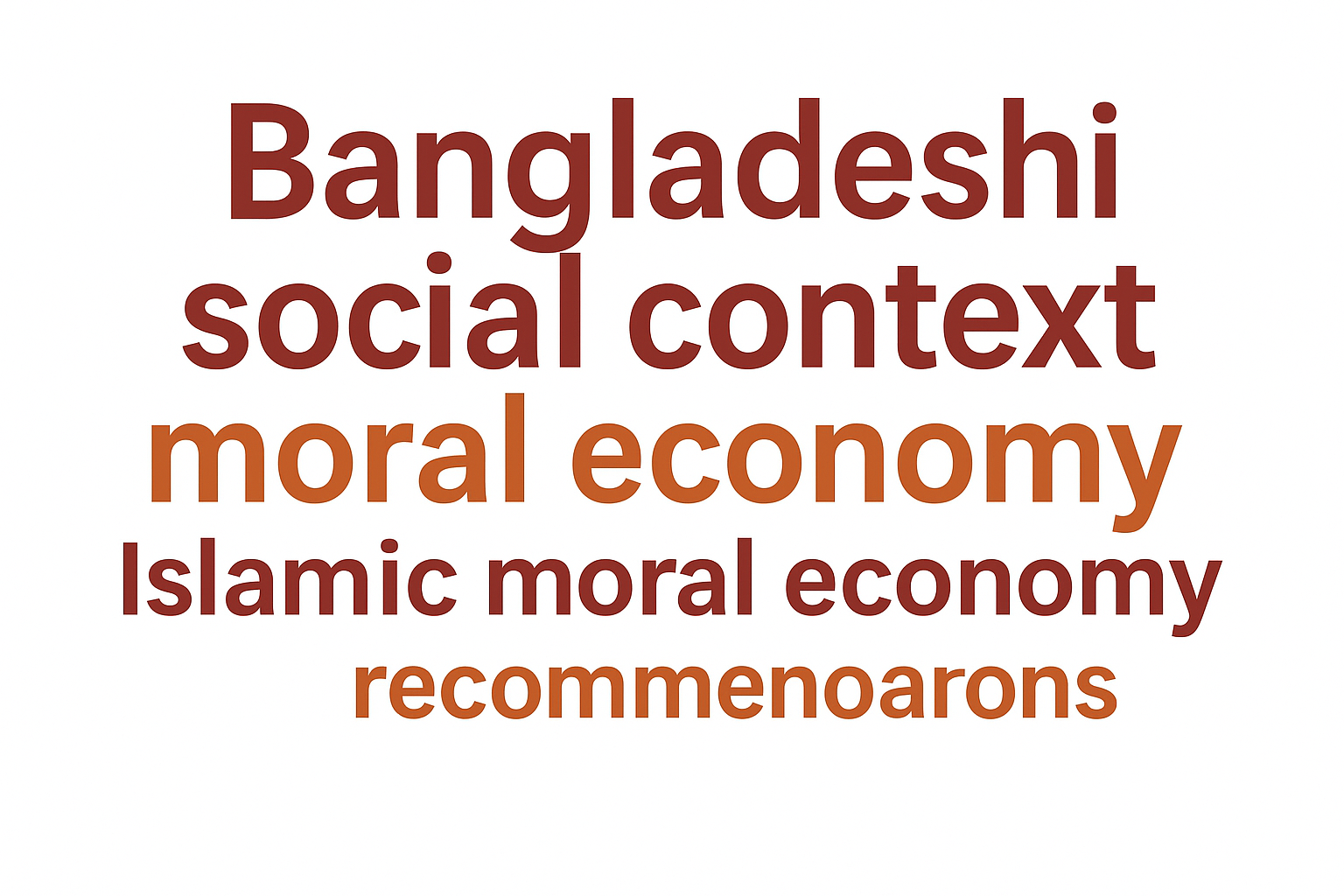The Challenges of Islamic Moral Economy in the Contemporary Social Context of Bangladesh
Abstract
 Abstract Views: 0
Abstract Views: 0
The Islamic Moral Economy (IME) that was developed in the late 1960s and early 1970s offers a morally sound alternative to conventional economics focusing on justice and equity. Based on Islamic values, it encourages social responsibility, shared prosperity, and sustainable development using a unique economic and financial system. Islam is the predominant religion in Bangladesh, and the idea of an IME has drawn significant attention. Therefore, this study aims to provide an overview of the IME, and explore the contemporary state of the IME in the social context of Bangladesh. It also attempts to critically examine the multidimensional obstacles that hinder the effective implementation of IME in Bangladesh, focusing on the economic, social and political factors behind its complexity. The key findings revealthat the negative impacts of global capitalism, widespread corruption, violations of human rights, political instability, the rise of secularism and fragmented Islamic movements are significant obstacles that decrease economic justice and trust. The shortcomings of Islamic banking, which often ignore fundamental ethical values, also create significant obstacles. Finally, this paper seeks to illuminate the potential solutions for the IME from Bangladeshi perspective and offers valuable insights to policymakers, financial institutions, and researchers navigating Bangladesh's evolving economic landscape. With a qualitative approach, this paper relies on primary data from the professors of Islamic studies, political science and economics and an official of banking sector, and secondary data from journal articles, newspaper reports, social media, and related books.
Downloads
References
Abdin, Md. Joynal. “The Nature and Evolution of Capitalism in Bangladesh.”SSRN Electronic Journal, 2016. https://doi.org/10.2139/ssrn.2752969.
Ahmadi, Abdul Zahoor, Ade MuthiaAfifah, Walid Qarar, and HasibullahAtiqi. “Understanding Islamic Economics as an Islamic Moral Economy.” COMSERVA 4, no. 5 (2024): 1080–1088, https://doi.org/10.59141/comserva.v4i5.2172.
Ahsan, Muhammad Amimul., Md Jaweed Iqbal, and Md Cholem Ullah. “Islamization of Knowledge in Bangladesh: Hindrances and Solutions.” International Journal of Ethics in Social Sciences 1, no. 1 (2013): 149–168.
Ahsan, Muhammad Amimul, et al. Towards Understanding Ibadah in Islam. Dhaka: Bangladesh Institute of Islamic Thought, 2015.
Asutay, Mehmet. “A Political Economy Approach to Islamic Economics: Systemic Understanding for an Alternative Economic System.” Kyoto Bulletin of Islamic Area Studies 1, no. 2 (2007): 3–18.
—. “Conceptualisation of the Second-Best Solution in Overcoming the Social Failure of Islamic Finance: Examining the Overpowering of Homoislamicus by Homoeconomicus.” IIUM Journal of Economics and Management 15, no. 2 (2007): 167–195,
—. “Conceptualising and Locating the Social Failure of Islamic Finance: Aspirations of Islamic Moral Economy vs the Realities of Islamic Finance.” Asian and African Area Studies 11, no. 2 (2012): 93–113, https://doi.org/10.14956/asafas.11.93.
—. “Islamic Banking and Finance: Social Failure.”New Horizon 169 (2008): 1–3.
—. “Islamic Moral Economy as the Foundation of Islamic Finance.” In Islamic Finance in Europe, 55–68. Cheltenham: Edward Elgar Publishing, 2013.
Ayres, Alyssa. “Bangladesh: Capitalist Haven?” Forbes, October 28, 2014. https://www.forbes.com/sites/alyssaayres/2014/10/28/bangladesh-capitalist-haven/?sh=6656e81d145e.
Dhaka Tribune. “Bangladeshi Academic Wins Top Global Prize in Islamic Economics.” May 29, 2022. https://www.dhakatribune.com/bangladesh/2022/05/29/bangladeshi-academic-wins-top-global-prize-in-islamic-economics.
Hasan, Zubair. “Islamic Finance: The Structure-Objective Mismatch and Its Consequences.”ISRA International Journal of Islamic Finance 2, no. 1 (2010): 35–60, https://doi.org/10.55188/ijif.v2i1.76.
Hernández Cortez, Noé, Jesús Moya Vela, and Ernesto Menchaca Arredondo. “El discursonacional-popular de Andrés Manuel López Obrador (2018–2020).” (The national-popular discourse of Andrés Manuel López Obrador (2018–2020) Revista Republicana 31 (2021): 39–54.
High Commission for Bangladesh to Canada. “Overview of Bangladesh Economy.” Accessed February 2, 2023. https://www.bdhcottawa.ca/economy-and-trade/overview-of-bangladesh-economy.
Karim, Shafiel A. The Islamic Moral Economy: A Study of Islamic Money and Financial Instruments. Boca Raton, FL: Universal-Publishers, 2010.
Karimullah, Suud Sarim. “Keadilan Ekonomi Islam Sebagai Solusi Alternatif Bagi Krisis Ekonomi Global.” (Islamic Economic Justice as an Alternative Solution to the Global Economic Crisis). JurnalRiset Hukum, Ekonomi Islam, Ekonomi, Manajemen Dan Akuntansi 4, no. 1 (25 January 2025): 133–52. Accessed doi:10.61393/heiema.v4i1.273.
Khan, Hanna Ambaras., Foyasal Khan, and Soura Jit Barua. “Alternative Dispute Resolution and Sustainability of Economic Development for the Consumer’s Benefit: An Islamic Moral Economy Perspective.” Asian Journal of Law and Policy 2, no. 2 (2022): 99–111, https://doi.org/10.33093/ajlp.2022.7.
Mashudi, Yudi. “Complexity of Sharia Economic Problems.” Journal of Law and Regulation Governance2, no. 7 (10 September 2024): 260–80. https://doi.org/10.57185/jlarg.v2i7.63.
MSNBC. “Sanders on the Need for a Moral Economy.” April 15, 2016. https://www.msnbc.com/msnbc-news/watch/sanders-on-the-need-for-a-moral-economy-666808899785.
Nagaoka, Shinsuke. “Beyond the Theoretical Dichotomy in Islamic Finance: Analytical Reflections on Murabaha Contracts and Islamic Debt Securities.” Kyoto Bulletin of Islamic Area Studies 1, no. 2 (2007): 72–91.
Rahman, Sheikh Mujibur. The Unfinished Memoirs. Translated by Fakrul Alam. Dhaka: University Press Limited, 2012.
Scott, James C. The Moral Economy of the Peasant: Rebellion and Subsistence in Southeast Asia. New Haven: Yale University Press, 1976.
Siddiqi, Dina Mahnaz. “Political Culture in Contemporary Bangladesh: Histories, Ruptures and Contradictions.” In Political Islam and Governance in Bangladesh, edited by Ali Riaz and C. Christine Fair, 21–40. London and New York: Routledge, 2010.
Statista. “Worldwide Growth of Islamic Banking Assets.” Accessed February 2, 2023. https://www.statista.com/statistics/1090891/worldwide-growth-of-islamic-banking-assets/.
The Daily Star. “Bangladesh Ranks Second Most Corrupt in South Asia Again: TIB.” January 25, 2023. https://www.thedailystar.net/news/bangladesh/news/bangladesh-ranks-second-most-corrupt-south-asia-again-tib-3235211.
Thompson, Edward P. “The Moral Economy of the English Crowd in the Eighteenth Century.” Past and Present 50 (1971): 76–136.
TheGlobalEconomy.com. “Political Stability in Bangladesh.” Accessed February 2, 2023. https://www.theglobaleconomy.com/Bangladesh/wb_political_stability.
Yusop, Mohd Mahyudi Mohd. “The Moral Economy and Islamic Economics: How Does ‘Universal Man’ Enter Future Discourse?” International Journal of Economics, Management and Accounting (2021): 361–379, https://doi.org/10.31436/ijema.v29i2.867.

Copyright (c) 2025 Mohammad Amimul Ahsan, Saber Ahmad, Mohammad Jaweed Iqbal, Habib Ullah, Mohammad Jonaed Kabir

This work is licensed under a Creative Commons Attribution 4.0 International License.

This work is licensed under a Creative Commons Attribution 4.0 International License. Authors retain copyright and grant the journal right of first publication with the work simultaneously licensed under a Creative Commons Attribution (CC-BY) 4.0 License that allows others to share the work with an acknowledgement of the work’s authorship and initial publication in this journal.







